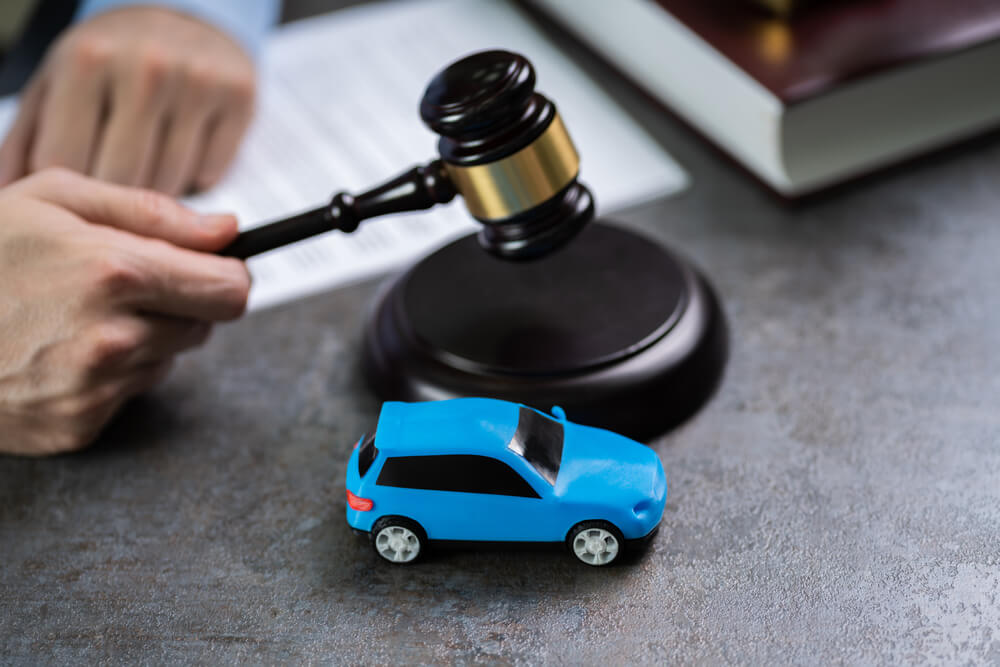Car accidents can seriously disrupt every aspect of your life, from physical health to financial stability. You need to understand the timeline to manage your expectations and plan your future.
This guide, with the assistance of a car accident attorney, will explore the factors that influence the duration of car accident cases, the steps involved in pursuing compensation, and what you can do to help expedite the process so you can focus on healing and moving forward after a collision.
Determining Liability

The first step in pursuing compensation after a car accident is determining who is liable or at fault for the collision. Establishing liability involves gathering evidence, including photographs, videos, witness statements, and police reports, to piece together what happened. The liable party must typically compensate the other parties for losses, such as medical bills, lost income, vehicle repairs, or other damages.
Sometimes, the evidence at the scene makes liability clear. However, if fault is disputed, determining who is liable in more complex cases can take weeks or even months. Several factors can impact the timeline for determining fault. The availability of evidence, such as security camera footage or eyewitnesses, can speed up the process. The determination can be faster when the evidence clearly shows that one party is liable than if the evidence is unclear or disputed.
Cooperative parties who are willing to share information and work together expedite the process, while adversarial parties will slow it down. Cases with multiple vehicles and parties take longer to determine liability due to the increased complexity and higher likelihood of holdouts or challenging parties.
When filing an insurance claim, insurers will conduct investigations to verify liability, which can extend the timeline. Parties dealing with insurance companies may benefit from hiring an car accident attorney to represent them through the claims process.
Attorneys typically also investigate and conduct discovery to collect evidence, which can prolong the liability determination process. However, the evidence attorneys obtain can significantly impact the outcome of a claim.
Remain patient during this stage and follow the advice of your legal counsel. While waiting for a decision to determine liability can frustrate you, providing incomplete or disputed information will only slow down the determination or cause the court to deny your claim. You can begin negotiating a settlement or seeking compensation through a lawsuit after the establishment of liability.
Severity of Injuries
The severity of injuries sustained in a car accident has a direct impact on how long it takes to resolve a settlement. Minor injuries, including whiplash or soft tissue damage, typically heal more quickly and do not require extensive treatment, which allows settlement negotiations to move forward more quickly, as total losses are easier to calculate. However, certain common injuries in car accidents, such as broken bones, head trauma, or spinal damage, can take significantly longer to heal and treat, prolonging the settlement process.
Severe injuries require more intensive treatment, such as surgery, hospitalization, and physical therapy, which the victim must complete before they have a clear picture of their physical and psychological losses. It can be difficult to determine the future medical expenses needed for continued treatment and recovery of serious injuries.
A victim can obtain documentation from medical professionals to verify the severity and expected impact of injuries during the recovery period. More serious injuries may necessitate more medical intervention and, thus, more documentation.
For the highest and most accurate settlement, victims should wait until they reach maximum medical improvement (MMI) before settlement. An individual has reached MMI when their medical condition has stabilized, and further recovery or improvement is unlikely.
In addition to physical losses, serious injuries often mean extended time away from work and can result in loss of income. Quantifying the total lost wages and impacts on earning capacity requires time and can delay settlement progress.
Car accident victims typically obtain higher settlements for severe, life-altering injuries due to the considerable pain, trauma, disability, disfigurement, or poorer quality of life. Calculating appropriate compensation for these subjective losses is complex and lengthens the settlement process.
All of the above factors can contribute to a longer settlement duration, and though waiting can be stressful, consulting medical professionals, legal counsel, and financial experts is key to ensuring you receive fair compensation.
Insurance Company Negotiations
After the determination of liability and medical treatment are complete, the next step toward a settlement typically involves negotiating with insurance companies to reach an agreement on a settlement amount. The timeline for these negotiations can vary from a few months to years, depending on numerous factors.
Cases involving severe, permanent injuries, multiple parties, or disputed liability are more complex to negotiate and settle. Simple injury claims with clear liability require less negotiation. Additionally, insurers and parties willing to cooperate, provide requested documentation, and compromise on a settlement amount can expedite negotiations. However, heavy caseloads for insurance companies and attorneys can lead to delays in negotiations as they work through other cases.
Seasoned legal counsel can settle cases more efficiently and aggressively. When the initial offers from each party are reasonably close, this can lead to a speedier settlement. However, the attorney can take time to negotiate through counteroffers and compromise when an insurer's offer is far from the victim's demand.
If negotiations break down, the victim may need to commence a lawsuit to obtain compensation. Litigation significantly prolongs the timeline to resolution, which is why most parties aim to settle through negotiations to avoid the time and cost of going to court.
During negotiations, the insurance company will determine its initial settlement offer based on the details of the case. You should consult an attorney to determine what is a fair offer, evaluate the initial offer, and ensure it adequately accounts for all losses. Your attorney can prepare a counteroffer and provide necessary evidence to substantiate a higher settlement.
With patience and persistence, negotiations will progress with counteroffers and compromise until the parties reach a satisfactory settlement. However, litigation may be necessary if the parties cannot agree after reasonable effort. This development, of course, will significantly increase the timeline but can be necessary to obtain fair compensation, especially for severe, complex cases.
It is important to cooperate fully during negotiations, keep the lines of communication open, and aim for a settlement that avoids the need for court intervention whenever possible. Still, do not settle for less than you deserve. Working with an attorney can ensure the insurance company makes a fair offer.
What Are the 7 Major Steps in Litigation?
If negotiations with insurance companies break down and a settlement cannot be reached, the next step is typically litigation or the filing of a lawsuit. Litigation involves pursuing compensation and a settlement through the court system and significantly impacts the timeline for resolution.
The seven major steps in litigation include:
- Filing a complaint: The plaintiff files a complaint with the court stating the details of the case and the compensation they seek. The defense typically has 30–90 days to respond.
- Discovery: The parties exchange evidence and take depositions to build the case. This can span months for complex cases.
- Pre-trial motions: Motions are filed to determine what evidence will be admissible at trial. Hearings take place, and a judge makes their rulings.
- Alternative dispute resolution: The parties may engage in mediation or arbitration to resolve the case before trial. If unsuccessful, they move forward with litigation.
- Trial: A trial takes place, including jury selection, opening and closing statements from attorneys, examination and cross-examination of witnesses, the introduction of evidence, and jury deliberation.
- Verdict and award: The jury returns a verdict in favor of the plaintiff or defendant. The court then awards compensation in an amount they deem fair.
- Appeals: If necessary, the losing party may appeal the court's decision or verdict. The appeals process adds significantly to the total timeline, often 6–18 months.
You should only use litigation as a last resort, after you exhaust other methods of settlement, as trials can significantly increase both the time and costs involved. However, some cases may require litigation to obtain reasonable compensation, especially when injuries are severe or the other party disputes liability.
If you proceed to litigation, choose your attorney carefully, be actively involved in building your case, and aim for settlement whenever possible to minimize time and expense. With patience, many months or even years of commitment may be necessary to see the case through to resolution via verdict, settlement, or appeal.
Mediation and Arbitration

Parties may opt for mediation or arbitration to resolve a car accident claim as an alternative to litigation. These alternative dispute resolution methods are usually faster and less expensive than proceeding to court. However, the timeline still varies depending on the complexity of the case and other factors.
Mediation involves hiring a neutral third-party mediator to facilitate negotiations between the parties. The mediator helps evaluate the case details, evidence, and legal issues to determine a reasonable settlement offer. Arbitration is more formal, with an arbitrator acting as a private judge to oversee the case, hear arguments, and ultimately make a binding decision.
The major benefits of mediation and arbitration include the following:
- Speed: Settlement is typically faster than moving through the litigation process in court due to fewer rules and procedures.
- Less expense: Fewer court fees and legal costs are involved compared to litigation. Attorney involvement may still be necessary, but fees are often lower.
- Flexibility: The parties have more flexibility to craft a settlement that suits their needs compared to the limited outcomes possible with litigation. The parties can consider a range of options.
- Control: The parties maintain more control over the process and outcome compared to relinquishing control to a judge or jury during litigation. However, they lose the option of an appeal that the court can provide.
- Privacy: Mediation and arbitration are private rather than public court records. The details and settlement of the case remain confidential.
In many cases, mediation and arbitration offer a worthwhile alternative to expedite resolution and save significant time, money, and energy that they would otherwise pour into litigation. With experienced representatives in place to argue the merits of your claim, mediation or arbitration can be an efficient path to fair settlement of your car accident injuries when possible.
Litigation remains an option with no obligation to accept an unfavorable settlement if unsuccessful. With several options available, consult your attorney to determine the right approach based on the details of your unique case.
Case Backlog
One factor impacting the timeline of a car accident settlement that is outside the parties' control is the backlog of cases in the court system and with insurance companies. Heavy caseloads mean that attorneys, claims adjusters, and the courts cannot promptly address new cases, leading to delays. The more severe the backlog, the longer resolution may take, regardless of other variables.
Courts' limited staffing and resources to handle all incoming cases often cause case backlogs. Additionally, increasingly severe or complex cases may require more time and resources to litigate or settle. This contributes to the backlog by reducing the availability to handle other standard cases.
Unfortunately, as an individual, you have little control over factors that contribute to court and insurance backlogs. However, choosing experienced legal representation can help expedite your claim as much as possible. Attorneys accustomed to navigating the system, even with delays, can work to keep your case moving forward through prompt responses and follow-up and can determine alternative options, such as mediation, when reasonable.
A backlog may slow the timeline of your settlement by a few months; however, the good news is that most severe backlogs are temporary, as there are resources to address the issue or identify and resolve the root causes. Staying actively involved in your case and cooperating fully with your counsel and the courts will help ensure as speedy a resolution as possible, regardless of the circumstances outside of your control.
Car Accident Case Timelines
The timeline for resolving a car accident case can vary greatly depending on the details of your unique case and circumstances. Settlement negotiations can take time. If you must resort to litigation is necessary, can take longer than you might expect and present even more unanticipated delays and challenges.
To expedite the resolution of your car accident settlement, consult an experienced personal injury lawyer. It is crucial to provide them with prompt and accurate information while maintaining realistic expectations about the timeline based on your circumstances.
While pursuing fair compensation after a collision can require dedication and patience, especially for complex or severe injury claims, focusing on resolution and closure will help you move on with your life as quickly as possible. With the right approach, perseverance, and your attorney by your side, the settlement of your car accident claim will come in due time and with the compensation you deserve.








